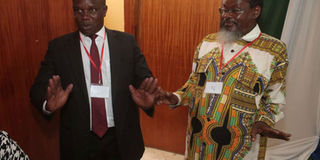Lecturers, employers to begin talks on new pay deal

Universities Academic Staff Union secretary-general Constantine Wasonga (left) with the organisation’s chairman Muga K’Olale during a National Delegates Conference at Bontana Hotel in Nakuru on Friday. PHOTO | AYUB MUIYURO | NATION MEDIA GROUP
What you need to know:
The meeting between the Universities Academic Staff Union (Uasu) and universities will also be attended by officials of the Federation of Kenya Employers.
The deal was signed last week after a one-month strike that paralysed learning at 31 public universities.
University lecturers and their employers will on Monday return to the negotiating table for talks on a new collective bargaining agreement.
The meeting between the Universities Academic Staff Union (Uasu) and universities will also be attended by officials of the Federation of Kenya Employers. It will be held at Jacaranda Hotel in Nairobi.
According to a return-to-work formula that was signed by Uasu secretary-general Constantine Wasonga and Vice-Chancellors Committee chairman Francis Aduol last week, the talks are supposed to be concluded by January 31.
“Kindly plan to attend the meeting as scheduled. The agenda will be to prepare for the 2017-2021 CBA,” said the University of Nairobi deputy vice-chancellor, Prof Isaac Mbeche, who is also the chairman of the negotiating committee.
The deal was signed last week after a one-month strike that paralysed learning at 31 public universities.
SALARIES
This followed the release of Sh2 billion by the government for the payment of enhanced salaries and house allowances for lecturers. Some Sh3.1 billion will be released in seven months for the 2013-2017 CBA.
They also agreed that all pending internal 2013-2017 CBAs for individual universities will now be concluded by February 28.
“All outstanding employers’ contributions to pensions accruing from the 2010-2013 and 2013-2017 CBAs be factored in the 2018/2019 budget and be paid to the employees’ retirement benefits schemes,” states the agreement signed last week.
The accrued pension stands at Sh4 billion — Sh2 billion for the 2010-2013 CBA and Sh2 billion for 2013-2017.
The university pension scheme is contributory. The employer contributes 20 per cent and the employee 10 per cent.
Yesterday, Dr Wasonga said the union will attend the meeting.
TRIBALISM
At the same time, university lecturers have cited tribalism and political interference as the greatest threat to the running of public universities in Kenya.
During a Uasu National Delegates Conference in Nakuru on Friday, the academics said the two vices constitute the rot at the institutions of higher learning.
Uasu chairman Muga K’Olale said the vices had infiltrated job appointments and staff promotions, thus affecting the quality and standards of education.
He cited the ethnicity factor that featured prominently during interviews for the Moi University VC position, saying this shows the rot at the institutions.
“Because of ethnicity and political factors, the country has seen 60 per cent of university managers hailing from the community within which the institution is located,” said Prof K’Olale. He noted that there are some universities that had failed to promote their staff for more than eight years because most qualified candidates are not from their backyard.
POLITICAL BARRIER
The official pointed out that the problem had also affected the running of the unions’ affairs because the tribal appointments led to the creation of a political barrier at the institutions.
Elsewhere, the government has released Sh3 billion to universities, research institutions and post-graduate students for their research.
National Research Fund acting chief executive Jemimah Onsare said under the programme, master’s students have been given Sh200,000 each. He added that Sh2 million was for doctorate students, Sh20 million for institutional research and Sh100 million for infrastructure development at universities.
STRATEGIC PLAN
Speaking during the launch of the fund’s strategic plan, Dr Onsare said they received 1,700 applications for all the categories. He invited applications for next year’s research programme.
“We had three categories — postgraduate students, institutional and infrastructural support,” said the acting chief executive officer.
Master’s students will be funded for one year while those pursuing PhD studies will get funding for three years.
Reported by Ouma Wanzala, Joseph Openda and Peter Mburu



